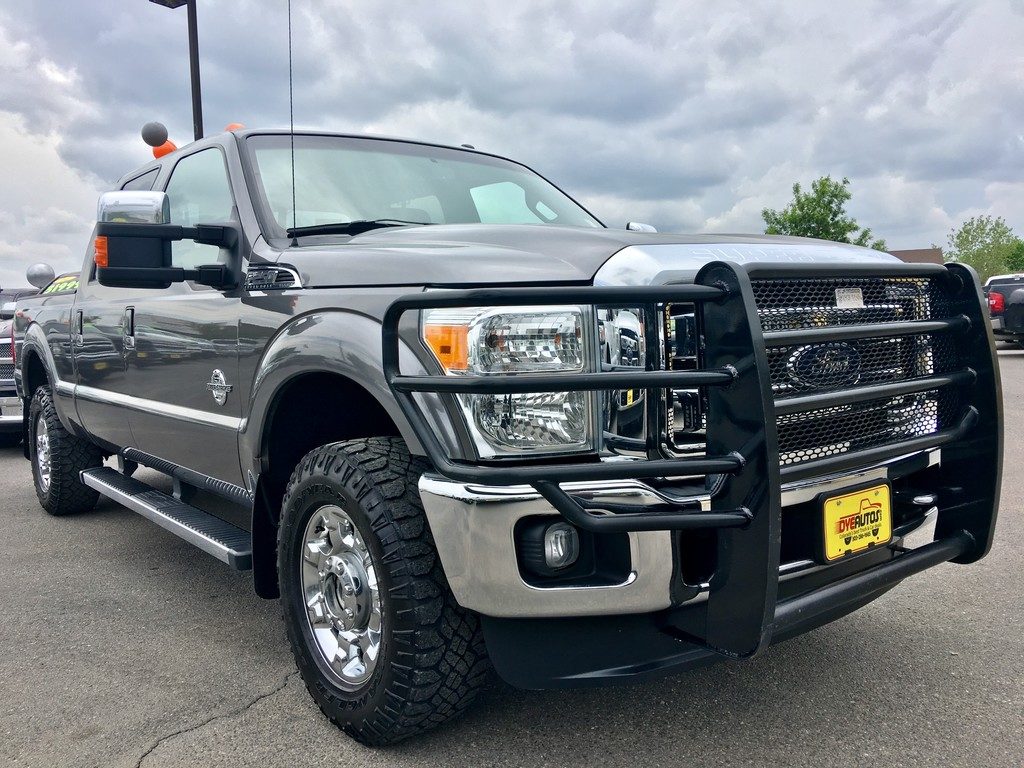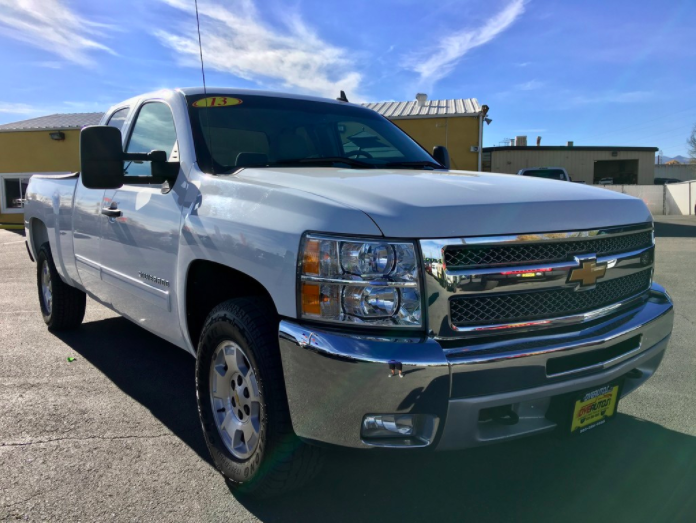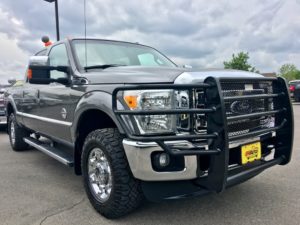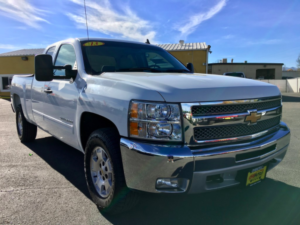Dye Autos Denver Area Truck and Automotive Blog
4 Reasons Why it’s Better to Buy a Pickup Truck Instead of a Car
 There’s a lot of talk in the news about self-driving cars and ride sharing. So much so that it’s easy to forget about our day-to-day realities as drivers. News outlets urge us to consider our environmental impact or spend less time behind the wheel. But that’s caused us to forget the #1 reason most of us buy vehicles today – practicality.
There’s a lot of talk in the news about self-driving cars and ride sharing. So much so that it’s easy to forget about our day-to-day realities as drivers. News outlets urge us to consider our environmental impact or spend less time behind the wheel. But that’s caused us to forget the #1 reason most of us buy vehicles today – practicality.
Want to know what’s the most practical vehicle out there? The pickup truck.
It will be years before self-driving cars will be safe on the road and while ride-sharing can work in certain circumstances, most of us need our vehicles to take us through our daily lives. There’s no better vehicle to handle all that life brings than a pickup truck.
If you’re in the market for a vehicle and you’ve only thought about a car, here are 4 reasons to buy a pickup truck instead.
#1: Pickup trucks support every activity
All it takes is a couch or armoire that needs to be moved from “here” to “there,” and next thing you know, you’re thinking you really should own a pickup truck.
But there are so many other activities that a pickup truck is perfect for:
- Trucks are the perfect weekend adventure vehicle.
- Trucks have the power to tow whatever you need.
- Trucks haul everything from groceries to lumber to tools.
- Trucks are a camper’s dream.
- Pickup trucks help you work hard and when it’s time to relax, they help you do that too!
Think of all the incredibly cool things you could be doing with a pickup truck that are impossible with the car you’re now driving.
#2 Pickup trucks are safer
It may seem obvious that larger pickup trucks are safer than small cars, but there are studies to back this up.
“In its studies, the Insurance Institute for Highway Safety (IIHS) has found that a heavier vehicle will typically push a lighter one backward during the impact,” explains Edmunds.com. “As a result, there is less force on the occupants of the heavier vehicle and more on those in the lighter vehicle, according to IIHS. The organization’s fatality data bears this out.”
Additionally, sitting up high gives a driver an excellent field of view. The ability to see over traffic enables the driver to identify potential accidents sooner and react with more time than passenger car drivers, whose vision is hindered by other vehicles.
#3 Pickup trucks are roomy
We know pickup trucks can haul just about anything, but people who haven’t ridden in a modern truck are always surprised by how roomy they are inside.
A four-door F-150 has a half-inch more rear-seat legroom than a Mercedes flagship luxury sedan—the $90,000+ S-Class—and much more head, shoulder, and hip room. Other full-size trucks offer similar space.
#4 Pickup trucks are affordable
Pickup trucks offer more bang for your buck than most cars:
- Enough power to tow or haul virtually anything
- More interior space than a luxury car
- Enough horsepower to get up and go
- Enough room in the bed for two people to sleep comfortably
- Surprisingly good fuel economy, given all the above
Combine all these merits into one vehicle and the result is surprisingly affordable.
Choosing the right pickup truck for you…
The only thing left to do is decide which pickup truck works for your lifestyle. We wrote a super helpful post about how to choose the best pickup truck for your needs >>here<<.
At Dye Autos, we’ve got a lot of pickup trucks – many under $20,000. We’re ready to help you determine which used pickup truck works for your lifestyle and your financial needs. Call us at (303) 286-1665 or fill out our handy online form >>here<<.
Read More How do you choose the best pickup truck for your needs? Answer the following seven questions and you’ll be much better equipped to decide when it comes time to buy.
How do you choose the best pickup truck for your needs? Answer the following seven questions and you’ll be much better equipped to decide when it comes time to buy.
1. Do you prefer a specific brand?
Is there a manufacturer that you’re partial to? Start with that brand.
If you haven’t shopped in awhile, keep your options open because your favorite brand many have changed specs and another brand might be a better option.
2. What do you plan on carrying or hauling?
How you plan to use the pickup truck will steer you through many of the choices and help you narrow the field.
- Towing a boat or Jet Ski? You might need four-wheel drive to gain traction on slippery boat ramps.
- Pulling a very large mobile home, you might need a “dually” (two rear wheels per side) for towing stability.
If you just like the idea of driving a pickup truck and don’t really plan on hauling anything major, a midsize truck such as the Toyota Tacoma, Chevrolet Colorado or Ford Ranger would be suitable considerations.
3. Compact, midsize or full size pickup truck?
Compact pickup trucks are smaller in scale than their larger size counterparts. They can usually tow up to about 3,000 pounds, a weight that accommodates many trailers and handles most boat towing tasks.
If you have heavier towing needs, move up to a mid-size or full-size truck.
Keep in mind that trucks considered ‘small’ in the past have grown in size and towing capability over the last decade.
Mid-size pickups can be closer in size and abilities to either a compact or to a full-size truck. Comparing models on dealer lots is the best way to understand how they actually look when placed side by side.
Dye Autos sells lots of pickup trucks and we can help you compare. Check out our post on pickup truck comparisons >>here<< and get in touch with us >>here<<
4. Standard, extended or crew cab?
How many people need to ride with you? Most manufacturers offer three cab sizes:
- Standard cab is the classic work truck with a single row of seating and limited space between the seats.
- Extended cab has jump seats or a bench seat behind the front seats. ProTip: Be sure to sit in the back while someone else drives the vehicle so that you have a feel for how it feels to ride in the back. Most extended cab seats are utilitarian and not intended for comfort during a long ride.
- Crew-cab trucks have four full-size doors and a generous backseat roomy enough for cross-country travel. Crew cabs are gaining in popularity now that many drivers use pickup trucks as their primary vehicle.
5. Standard or long bed?
The bed sizes vary slightly by manufacturer but are approximately 5.5 feet, 6.5 feet and 8 feet. Though it’s nice to have lots of room for cargo, combining a crew cab with an 8-foot bed might mean you can’t put the truck in your garage.
6. Planning on towing a trailer?
How much weight do you need to pull? Check the towing capacity of the pickup trucks you’re considering to make sure each one meets your needs.
You’ll need to find out the Gross Vehicle Weight Rating (GVWR) of what you’re going to tow.
You’ll find this on the trailer “VIN plate” (Vehicle Identification Number) or by contacting the trailer manufacturer. The GVWR is the dry weight of the trailer (empty weight) plus the maximum allowed payload.
- Your trailer may be as little as a 12-ft pop-up camper with a GVWR of under 3,000 lbs.
- Perhaps, it’s a behemoth conventional camping trailer that is 40-ft long and approaching 14,000 lbs GVWR.
- How about a triple-axle 43-ft long 5th-wheel toy hauler that is pushing a total weight rating of 20,000 lbs?
- It may be a large boat, a cargo trailer, or a horse trailer.
Figure out the GVWR of the trailer, as well as the loaded weight of your specific setup.
7. What’s your budget?
Pickup truck prices vary greatly. Knowing what you can spend is the first step.
It’s important to understand your budget and match it with the kind of truck you want. There are many options to choose from it’s crucial to set your expectations. While the most expensive pickup trucks can make you salivate, their price tag won’t.
At Dye Autos, we’ve got many pickup trucks under $20,000. We’re ready to help you determine which used pickup truck works for your lifestyle and your financial needs.
Read More We sell a lot of pickup trucks here at Dye Autos. With our level of experience, we get a lot of questions from consumers about trucks and towing capacity. It’s important to know the details of the truck you’re considering to purchase and we’re here to help you figure that out.
We sell a lot of pickup trucks here at Dye Autos. With our level of experience, we get a lot of questions from consumers about trucks and towing capacity. It’s important to know the details of the truck you’re considering to purchase and we’re here to help you figure that out.
To choose the best pickup for towing, truck shoppers should consider the factors that contribute to towing capability.
Start by asking yourself two simple questions will help you narrow your choices:
- What do you plan to tow?
- How will you use your pickup when you’re not towing?
If you’ll often use your pickup without the trailer, you’ll want to choose a vehicle that suits those needs, too. You’ll want to choose a lighter or more-efficient pickup that’s able to handle your trailer but is also a ride that you can live with every day.
Determine the size and weight of your trailer.
You’ll need to find out the Gross Vehicle Weight Rating (GVWR) of what you’re going to tow.
You’ll find this on the trailer “VIN plate” (Vehicle Identification Number) or by contacting the trailer manufacturer. The GVWR is the dry weight of the trailer (empty weight) plus the maximum allowed payload.
- Your trailer may be as little as a 12-ft pop-up camper with a GVWR of under 3,000 lbs.
- Perhaps, it’s a behemoth conventional camping trailer that is 40-ft long and approaching 14,000 lbs GVWR.
- How about a triple-axle 43-ft long 5th-wheel toy hauler that is pushing a total weight rating of 20,000 lbs?
- It may be a large boat, a cargo trailer, or a horse trailer.
Figure out the GVWR of the trailer, as well as the loaded weight of your specific setup.
Light Duty or Heavy Duty Pickup Truck?
Some light-duty trucks offer huge towing capacities in excess of 10,000 pounds, but drivers with big trailers, such as fifth-wheel campers or gooseneck horse trailers, may be better off with a heavy-duty pickup, such as the Ford F250 Super Duty, Dodge Ram 2500, or Chevy Silverado. Again, frequency of use is a consideration.
“The Ford F150 Ecoboost with Max Tow has trailer pulling capability that works well for many of our customers. It’s actually better than a diesel because it generally costs less and has less maintenance.” – Scott Dye
If you plan to tow a personal watercraft or a light-utility trailer, you may not even need a full-size pickup. Consider a smaller truck, such as the Toyota Tacoma or the upcoming Chevy Colorado, if you’re only pulling a light trailer.
Do I need a 4×4?
A 4×4 can be very handy, especially for pulling a trailer on uneven surfaces. A slippery boat ramp, soft ground or a hill with loose gravel might spell trouble for a 2-wheel-drive pickup, but a 4×4 should be able to climb right out, trailer in tow.
Four-wheel-drive pickups typically have slightly lower towing capacities than their 2-wheel-drive counterparts due to the extra weight of the 4-wheel-drive components.
What all this means for you…
Bottom Line? The best pickup for towing is the one that’s rated to pull your trailer and will suit your needs even when you don’t have a trailer behind you.
The task of determining the towing capacity of a particular pickup may seem daunting with so many factors coming into play. We can help you determine the best pickup truck for your specific lifestyle and needs. Get in touch >>here<< or call us at (303) 286-1665.
We’re here to help!
Read More6 Pitfalls to Avoid When Trading in Your Used Pickup Truck
 It’s time to purchase a “new” used truck, and you’re thinking about the trade-in value you could get on your current truck. Before you send your vehicle off to its next home, there are some things you need to know before trading in your used pickup truck.
It’s time to purchase a “new” used truck, and you’re thinking about the trade-in value you could get on your current truck. Before you send your vehicle off to its next home, there are some things you need to know before trading in your used pickup truck.
Over the years, our customers have always appreciated the information we provide. We believe that knowing all the facts makes for a better customer experience.
Here are 6 common mistakes to avoid when trading in your used pickup truck:
1. Overestimating or underestimating your vehicle’s value.
Trading in your used pickup truck can be challenging and not being realistic about its value will make things more difficult.
Be honest with yourself about your vehicle’s trade-in condition. The more forthright you are when using online appraisal tools like Edmunds.com or kbb.com, the better off you’ll be when it comes time to trade it in. Very often, people come into the dealership with an overly-optimistic idea of what their car is worth, only to find that their expectations weren’t realistic.
2. Bringing in a dirty truck.
Dealers like to see a clean vehicle. It says that you care about your used truck and its value.
Before trading in your used pickup truck, always make sure that your car looks clean and smells as clean as possible. Doing this often increases the value of your trade in.
3. Over-fixing your truck.
Dealerships tend to agree that your best option is to not concern yourself with making major fixes to your trade in. If it’s something as simple as touching up a little scratch or popping out a small dent, these are the kinds of fixes that are recommended.
Anything larger scale would not be worth your investment because the dealership will be able to repair issues for much less than you would be asked to pay at a shop.
4. Forgetting important documents.
Bring all vehicle paperwork with you. Here’s a handy list…
- Certificate of title (if you don’t have it, the DMV can tell you how to get it replaced). Note: if you have an outstanding loan on the vehicle, this will not apply since the bank has your certificate of title.
- Current registration.
- All your keys and the owner’s manual.
- If you still have an open loan, you’ll need to bring your account number or a payment stub.
- Maintenance records. These help support your claims about whatever prior damage your truck has had and the repairs it has undergone.
5. Not having all your truck’s accessories.
Trading in your used pickup truck means you are trading in everything that goes along with it. Make sure the original owner’s manual and any extra keys are in the vehicle when you arrive at the dealership. Dealers like used trucks that still have all the accessories and may even give you a better deal on your trade when everything is there.
6. Not knowing your vehicle’s history.
Being familiar with your vehicle’s history will help during your trade-in negotiations. Be “upfront” with the dealer, especially on any major problems that you know of, even if those problems were caused by the previous owner.
In Summary…
Avoiding the major pitfalls when trading in your used pickup truck can often save you money. Getting the best price for your trade in allows you more purchase power on the “new” used pickup truck you intend to buy.
We suggest going somewhere to get an honest and trusted opinion on your vehicle. At Dye Autos, we’ve been selling great used trucks in Denver for many years and we’d love the chance to help you. Give us a call at (303) 286-1665 or simply fill out our online form >>here<<. We’ll be in touch!
Read More





